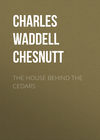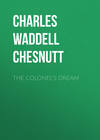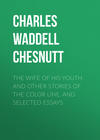Читать книгу: «The Marrow of Tradition»
I like you and your book, ingenious Hone!
In whose capacious all-embracing leaves
The very marrow of tradition's shown.
—CHARLES LAMB To the Editor of the Every-Day Book
I
AT BREAK OF DAY
"Stay here beside her, major. I shall not he needed for an hour yet. Meanwhile I'll go downstairs and snatch a bit of sleep, or talk to old Jane."
The night was hot and sultry. Though the windows of the chamber were wide open, and the muslin curtains looped back, not a breath of air was stirring. Only the shrill chirp of the cicada and the muffled croaking of the frogs in some distant marsh broke the night silence. The heavy scent of magnolias, overpowering even the strong smell of drugs in the sickroom, suggested death and funeral wreaths, sorrow and tears, the long home, the last sleep. The major shivered with apprehension as the slender hand which he held in his own contracted nervously and in a spasm of pain clutched his fingers with a viselike grip.
Major Carteret, though dressed in brown linen, had thrown off his coat for greater comfort. The stifling heat, in spite of the palm-leaf fan which he plied mechanically, was scarcely less oppressive than his own thoughts. Long ago, while yet a mere boy in years, he had come back from Appomattox to find his family, one of the oldest and proudest in the state, hopelessly impoverished by the war,—even their ancestral home swallowed up in the common ruin. His elder brother had sacrificed his life on the bloody altar of the lost cause, and his father, broken and chagrined, died not many years later, leaving the major the last of his line. He had tried in various pursuits to gain a foothold in the new life, but with indifferent success until he won the hand of Olivia Merkell, whom he had seen grow from a small girl to glorious womanhood. With her money he had founded the Morning Chronicle, which he had made the leading organ of his party and the most influential paper in the State. The fine old house in which they lived was hers. In this very room she had first drawn the breath of life; it had been their nuptial chamber; and here, too, within a few hours, she might die, for it seemed impossible that one could long endure such frightful agony and live.
One cloud alone had marred the otherwise perfect serenity of their happiness. Olivia was childless. To have children to perpetuate the name of which he was so proud, to write it still higher on the roll of honor, had been his dearest hope. His disappointment had been proportionately keen. A few months ago this dead hope had revived, and altered the whole aspect of their lives. But as time went on, his wife's age had begun to tell upon her, until even Dr. Price, the most cheerful and optimistic of physicians, had warned him, while hoping for the best, to be prepared for the worst. To add to the danger, Mrs. Carteret had only this day suffered from a nervous shock, which, it was feared, had hastened by several weeks the expected event.
Dr. Price went downstairs to the library, where a dim light was burning. An old black woman, dressed in a gingham frock, with a red bandana handkerchief coiled around her head by way of turban, was seated by an open window. She rose and curtsied as the doctor entered and dropped into a willow rocking-chair near her own.
"How did this happen, Jane?" he asked in a subdued voice, adding, with assumed severity, "You ought to have taken better care of your mistress."
"Now look a-hyuh, Doctuh Price," returned the old woman in an unctuous whisper, "you don' wanter come talkin' none er yo' foolishness 'bout my not takin' keer er Mis' 'Livy. She never would 'a' said sech a thing! Seven er eight mont's ago, w'en she sent fer me, I says ter her, says I:—
"'Lawd, Lawd, honey! You don' tell me dat after all dese long w'ary years er waitin' de good Lawd is done heared yo' prayer an' is gwine ter sen' you de chile you be'n wantin' so long an' so bad? Bless his holy name! Will I come an' nuss yo' baby? Why, honey, I nussed you, an' nussed yo' mammy thoo her las' sickness, an' laid her out w'en she died. I wouldn' let nobody e'se nuss yo' baby; an' mo'over, I'm gwine ter come an' nuss you too. You're young side er me, Mis' 'Livy, but you're ove'ly ole ter be havin' yo' fus' baby, an' you'll need somebody roun', honey, w'at knows all 'bout de fam'ly, an' deir ways an' deir weaknesses, an' I don' know who dat'd be ef it wa'n't me.'
"''Deed, Mammy Jane,' says she, 'dere ain' nobody e'se I'd have but you.
You kin come ez soon ez you wanter an' stay ez long ez you mineter.'
"An hyuh I is, an' hyuh I'm gwine ter stay. Fer Mis' 'Livy is my ole mist'ess's daughter, an' my ole mist'ess wuz good ter me, an' dey ain' none er her folks gwine ter suffer ef ole Jane kin he'p it."
"Your loyalty does you credit, Jane," observed the doctor; "but you haven't told me yet what happened to Mrs. Carteret to-day. Did the horse run away, or did she see something that frightened her?"
"No, suh, de hoss didn' git skeered at nothin', but Mis' 'Livy did see somethin', er somebody; an' it wa'n't no fault er mine ner her'n neither,—it goes fu'ther back, suh, fu'ther dan dis day er dis year. Does you 'member de time w'en my ole mist'ess, Mis' 'Livy upstairs's mammy, died? No? Well, you wuz prob'ly 'way ter school den, studyin' ter be a doctuh. But I'll tell you all erbout it.
"Wen my ole mist'ess, Mis' 'Liz'beth Merkell,—an' a good mist'ess she wuz,—tuck sick fer de las' time, her sister Polly—ole Mis' Polly Ochiltree w'at is now—come ter de house ter he'p nuss her. Mis' 'Livy upstairs yander wuz erbout six years ole den, de sweetes' little angel you ever laid eyes on; an' on her dyin' bed Mis' 'Liz'beth ax' Mis' Polly fer ter stay hyuh an' take keer er her chile, an' Mis' Polly she promise'. She wuz a widder fer de secon' time, an' didn' have no child'en, an' could jes' as well come as not.
"But dere wuz trouble after de fune'al, an' it happen' right hyuh in dis lib'ary. Mars Sam wuz settin' by de table, w'en Mis' Polly come downstairs, slow an' solemn, an' stood dere in de middle er de flo', all in black, till Mars Sam sot a cheer fer her.
"'Well, Samuel,' says she, 'now dat we've done all we can fer po' 'Liz'beth, it only 'mains fer us ter consider Olivia's future.'
"Mars Sam nodded his head, but didn' say nothin'.
"'I don' need ter tell you,' says she,' dat I am willin' ter carry out de wishes er my dead sister, an' sac'ifice my own comfo't, an' make myse'f yo' housekeeper an' yo' child's nuss, fer my dear sister's sake. It wuz her dyin' wish, an' on it I will ac', ef it is also yo'n.'
"Mars Sam didn' want Mis' Polly ter come, suh; fur he didn' like Mis' Polly. He wuz skeered er Miss Polly."
"I don't wonder," yawned the doctor, "if she was anything like she is now."
"Wuss, suh, fer she wuz younger, an' stronger. She always would have her say, no matter 'bout what, an' her own way, no matter who 'posed her. She had already be'n in de house fer a week, an' Mars Sam knowed ef she once come ter stay, she'd be de mist'ess of eve'ybody in it an' him too. But w'at could he do but say yas?
"'Den it is unde'stood, is it,' says Mis' Polly, w'en he had spoke, 'dat I am ter take cha'ge er de house?'
"'All right, Polly,' says Mars Sam, wid a deep sigh.
"Mis' Polly 'lowed he wuz sighin' fer my po' dead mist'ess, fer she didn' have no idee er his feelin's to'ds her,—she alluz did 'low dat all de gent'emen wuz in love wid 'er.
"'You won' fin' much ter do,' Mars Sam went on, 'fer Julia is a good housekeeper, an' kin ten' ter mos' eve'ything, under yo' d'rections.'
"Mis' Polly stiffen' up like a ramrod. 'It mus' be unde'stood, Samuel,' says she, 'dat w'en I 'sumes cha'ge er yo' house, dere ain' gwine ter be no 'vided 'sponsibility; an' as fer dis Julia, me an' her couldn' git 'long tergether nohow. Ef I stays, Julia goes.'
"Wen Mars Sam beared dat, he felt better, an' 'mence' ter pick up his courage. Mis' Polly had showed her ban' too plain. My mist'ess hadn' got col' yit, an' Mis' Polly, who'd be'n a widder fer two years dis las' time, wuz already fig'rin' on takin' her place fer good, an' she did n! want no other woman roun' de house dat Mars Sam might take a' intrus' in.
"'My dear Polly,' says Mars Sam, quite determine', 'I couldn' possibly sen' Julia 'way. Fac' is, I couldn' git 'long widout Julia. She'd be'n runnin' dis house like clockwo'k befo' you come, an' I likes her ways. My dear, dead 'Liz'beth sot a heap er sto' by Julia, an' I'm gwine ter keep her here fer 'Liz'beth's sake.'
"Mis' Polly's eyes flash' fire.
"'Ah,' says she,' I see—I see! You perfers her housekeepin' ter mine, indeed! Dat is a fine way ter talk ter a lady! An' a heap er rispec' you is got fer de mem'ry er my po' dead sister!'
"Mars Sam knowed w'at she 'lowed she seed wa'n't so; but he didn' let on, fer it only made him de safer. He wuz willin' fer her ter 'magine w'at she please', jes' so long ez she kep' out er his house an' let him alone.
"'No, Polly,' says he, gittin' bolder ez she got madder, 'dere ain' no use talkin'. Nothin' in de worl' would make me part wid Julia.'
"Mis' Polly she r'ared an' she pitch', but Mars Sam helt on like grim death. Mis' Polly wouldn' give in neither, an' so she fin'lly went away. Dey made some kind er 'rangement afterwa'ds, an' Miss Polly tuck Mis' 'Livy ter her own house. Mars Sam paid her bo'd an' 'lowed Mis' Polly somethin' fer takin' keer er her."
"And Julia stayed?"
"Julia stayed, suh, an' a couple er years later her chile wuz bawn, right here in dis house."
"But you said," observed the doctor, "that Mrs. Ochiltree was in error about Julia."
"Yas, suh, so she wuz, w'en my ole mist'ess died. But dis wuz two years after,—an' w'at has ter be has ter be. Julia had a easy time; she had a black gal ter wait on her, a buggy to ride in, an' eve'ything she wanted. Eve'ybody s'posed Mars Sam would give her a house an' lot, er leave her somethin' in his will. But he died suddenly, and didn' leave no will, an' Mis' Polly got herse'f 'pinted gyardeen ter young Mis' 'Livy, an' driv Julia an' her young un out er de house, an' lived here in dis house wid Mis' 'Livy till Mis' 'Livy ma'ied Majah Carteret."
"And what became of Julia?" asked Dr. Price.
Such relations, the doctor knew very well, had been all too common in the old slavery days, and not a few of them had been projected into the new era. Sins, like snakes, die hard. The habits and customs of a people were not to be changed in a day, nor by the stroke of a pen. As family physician, and father confessor by brevet, Dr. Price had looked upon more than one hidden skeleton; and no one in town had had better opportunities than old Jane for learning the undercurrents in the lives of the old families.
"Well," resumed Jane, "eve'ybody s'posed, after w'at had happen', dat Julia'd keep on livin' easy, fer she wuz young an' good-lookin'. But she didn'. She tried ter make a livin' sewin', but Mis' Polly wouldn' let de bes' w'ite folks hire her. Den she tuck up washin', but didn' do no better at dat; an' bimeby she got so discourage' dat she ma'ied a shif'less yaller man, an' died er consumption soon after,—an' wuz 'bout ez well off, fer dis man couldn' hardly feed her nohow."
"And the child?"
"One er de No'the'n w'ite lady teachers at de mission school tuck a likin' ter little Janet, an' put her thoo school, an' den sent her off ter de No'th fer ter study ter be a school teacher. W'en she come back, 'stead er teachin' she ma'ied ole Adam Miller's son."
"The rich stevedore's son, Dr. Miller?"
"Yas, suh, dat's de man,—you knows 'im. Dis yer boy wuz jes' gwine 'way fer ter study ter be a doctuh, an' he ma'ied dis Janet, an' tuck her 'way wid 'im. Dey went off ter Europe, er Irope, er Orope, er somewhere er 'nother, 'way off yander, an' come back here las' year an' sta'ted dis yer horspital an' school fer ter train de black gals fer nusses."
"He's a very good doctor, Jane, and is doing a useful work. Your chapter of family history is quite interesting,—I knew part of it before, in a general way; but you haven't yet told me what brought on Mrs. Carteret's trouble."
"I'm jes' comin' ter dat dis minute, suh,—w'at I be'n tellin' you is all a part of it. Dis yer Janet, w'at's Mis' 'Livy's half-sister, is ez much like her ez ef dey wuz twins. Folks sometimes takes 'em fer one ernudder,—I s'pose it tickles Janet mos' ter death, but it do make Mis' 'Livy rippin'. An' den 'way back yander jes' after de wah, w'en de ole Carteret mansion had ter be sol', Adam Miller bought it, an' dis yer Janet an' her husban' is be'n livin' in it ever sence ole Adam died, 'bout a year ago; an' dat makes de majah mad, 'ca'se he don' wanter see cullud folks livin' in de ole fam'ly mansion w'at he wuz bawn in. An' mo'over, an' dat's de wust of all, w'iles Mis' 'Livy ain' had no child'en befo', dis yer sister er her'n is got a fine-lookin' little yaller boy, w'at favors de fam'ly so dat ef Mis' 'Livy'd see de chile anywhere, it'd mos' break her heart fer ter think 'bout her not havin' no child'en herse'f. So ter-day, w'en Mis' 'Livy wuz out ridin' an' met dis yer Janet wid her boy, an' w'en Mis' 'Livy got ter studyin' 'bout her own chances, an' how she mought not come thoo safe, she jes' had a fit er hysterics right dere in de buggy. She wuz mos' home, an' William got her here, an' you knows de res'."
Major Carteret, from the head of the stairs, called the doctor anxiously.
"You had better come along up now, Jane," said the doctor.
For two long hours they fought back the grim spectre that stood by the bedside. The child was born at dawn. Both mother and child, the doctor said, would live.
"Bless its 'ittle hea't!" exclaimed Mammy Jane, as she held up the tiny mite, which bore as much resemblance to mature humanity as might be expected of an infant which had for only a few minutes drawn the breath of life. "Bless its 'ittle hea't! it's de we'y spit an' image er its pappy!"
The doctor smiled. The major laughed aloud. Jane's unconscious witticism, or conscious flattery, whichever it might be, was a welcome diversion from the tense strain of the last few hours.
"Be that as it may," said Dr. Price cheerfully, "and I'll not dispute it, the child is a very fine boy,—a very fine boy, indeed! Take care of it, major," he added with a touch of solemnity, "for your wife can never bear another."
With the child's first cry a refreshing breeze from the distant ocean cooled the hot air of the chamber; the heavy odor of the magnolias, with its mortuary suggestiveness, gave place to the scent of rose and lilac and honeysuckle. The birds in the garden were singing lustily.
All these sweet and pleasant things found an echo in the major's heart. He stood by the window, and looking toward the rising sun, breathed a silent prayer of thanksgiving. All nature seemed to rejoice in sympathy with his happiness at the fruition of this long-deferred hope, and to predict for this wonderful child a bright and glorious future.
Old Mammy Jane, however, was not entirely at ease concerning the child. She had discovered, under its left ear, a small mole, which led her to fear that the child was born for bad luck. Had the baby been black, or yellow, or poor-white, Jane would unhesitatingly have named, as his ultimate fate, a not uncommon form of taking off, usually resultant upon the infraction of certain laws, or, in these swift modern days, upon too violent a departure from established social customs. It was manifestly impossible that a child of such high quality as the grandson of her old mistress should die by judicial strangulation; but nevertheless the warning was a serious thing, and not to be lightly disregarded.
Not wishing to be considered as a prophet of evil omen, Jane kept her own counsel in regard to this significant discovery. But later, after the child was several days old, she filled a small vial with water in which the infant had been washed, and took it to a certain wise old black woman, who lived on the farther edge of the town and was well known to be versed in witchcraft and conjuration. The conjure woman added to the contents of the bottle a bit of calamus root, and one of the cervical vertebrae from the skeleton of a black cat, with several other mysterious ingredients, the nature of which she did not disclose. Following instructions given her, Aunt Jane buried the bottle in Carteret's back yard, one night during the full moon, as a good-luck charm to ward off evil from the little grandson of her dear mistress, so long since dead and gone to heaven.
II
THE CHRISTENING PARTY
They named the Carteret baby Theodore Felix. Theodore was a family name, and had been borne by the eldest son for several generations, the major himself being a second son. Having thus given the child two beautiful names, replete with religious and sentimental significance, they called him—"Dodie."
The baby was christened some six weeks after its birth, by which time Mrs. Carteret was able to be out. Old Mammy Jane, who had been brought up in the church, but who, like some better informed people in all ages, found religion not inconsistent with a strong vein of superstition, felt her fears for the baby's future much relieved when the rector had made the sign of the cross and sprinkled little Dodie with the water from the carved marble font, which had come from England in the reign of King Charles the Martyr, as the ill-fated son of James I. was known to St. Andrew's. Upon this special occasion Mammy Jane had been provided with a seat downstairs among the white people, to her own intense satisfaction, and to the secret envy of a small colored attendance in the gallery, to whom she was ostentatiously pointed out by her grandson Jerry, porter at the Morning Chronicle office, who sat among them in the front row.
On the following Monday evening the major gave a christening party in honor of this important event. Owing to Mrs. Carteret's still delicate health, only a small number of intimate friends and family connections were invited to attend. These were the rector of St. Andrew's; old Mrs. Polly Ochiltree, the godmother; old Mr. Delamere, a distant relative and also one of the sponsors; and his grandson, Tom Delamere. The major had also invited Lee Ellis, his young city editor, for whom he had a great liking apart from his business value, and who was a frequent visitor at the house. These, with the family itself, which consisted of the major, his wife, and his half-sister, Clara Pemberton, a young woman of about eighteen, made up the eight persons for whom covers were laid.
Ellis was the first to arrive, a tall, loose-limbed young man, with a slightly freckled face, hair verging on auburn, a firm chin, and honest gray eyes. He had come half an hour early, and was left alone for a few minutes in the parlor, a spacious, high-ceilinged room, with large windows, and fitted up in excellent taste, with stately reminiscences of a past generation. The walls were hung with figured paper. The ceiling was whitewashed, and decorated in the middle with a plaster centre-piece, from which hung a massive chandelier sparkling with prismatic rays from a hundred crystal pendants. There was a handsome mantel, set with terra-cotta tiles, on which fauns and satyrs, nymphs and dryads, disported themselves in idyllic abandon. The furniture was old, and in keeping with the room.
At seven o'clock a carriage drove up, from which alighted an elderly gentleman, with white hair and mustache, and bowed somewhat with years. Short of breath and painfully weak in the legs, he was assisted from the carriage by a colored man, apparently about forty years old, to whom short side-whiskers and spectacles imparted an air of sobriety. This attendant gave his arm respectfully to the old gentleman, who leaned upon it heavily, but with as little appearance of dependence as possible. The servant, assuming a similar unconsciousness of the weight resting upon his arm, assisted the old gentleman carefully up the steps.
"I'm all right now, Sandy," whispered the gentleman as soon as his feet were planted firmly on the piazza. "You may come back for me at nine o'clock."
Having taken his hand from his servant's arm, he advanced to meet a lady who stood in the door awaiting him, a tall, elderly woman, gaunt and angular of frame, with a mottled face, and high cheekbones partially covered by bands of hair entirely too black and abundant for a person of her age, if one might judge from the lines of her mouth, which are rarely deceptive in such matters.
"Perhaps you'd better not send your man away, Mr. Delamere," observed the lady, in a high shrill voice, which grated upon the old gentleman's ears. He was slightly hard of hearing, but, like most deaf people, resented being screamed at. "You might need him before nine o'clock. One never knows what may happen after one has had the second stroke. And moreover, our butler has fallen down the back steps—negroes are so careless!—and sprained his ankle so that he can't stand. I'd like to have Sandy stay and wait on the table in Peter's place, if you don't mind."
"I thank you, Mrs. Ochiltree, for your solicitude," replied Mr. Delamere, with a shade of annoyance in his voice, "but my health is very good just at present, and I do not anticipate any catastrophe which will require my servant's presence before I am ready to go home. But I have no doubt, madam," he continued, with a courteous inclination, "that Sandy will be pleased to serve you, if you desire it, to the best of his poor knowledge."
"I shill be honored, ma'am," assented Sandy, with a bow even deeper than his master's, "only I'm 'feared I ain't rightly dressed fer ter wait on table. I wuz only goin' ter pra'r-meetin', an' so I didn' put on my bes' clo's. Ef Mis' Ochiltree ain' gwine ter need me fer de nex' fifteen minutes, I kin ride back home in de ca'ige an' dress myse'f suitable fer de occasion, suh."
"If you think you'll wait on the table any better," said Mrs. Ochiltree, "you may go along and change your clothes; but hurry back, for it is seven now, and dinner will soon be served."
Sandy retired with a bow. While descending the steps to the carriage, which had waited for him, he came face to face with a young man just entering the house.
"Am I in time for dinner, Sandy?" asked the newcomer.
"Yas, Mistuh Tom, you're in plenty er time. Dinner won't be ready till I git back, which won' be fer fifteen minutes er so yit."
Throwing away the cigarette which he held between his fingers, the young man crossed the piazza with a light step, and after a preliminary knock, for an answer to which he did not wait, entered the house with the air of one thoroughly at home. The lights in the parlor had been lit, and Ellis, who sat talking to Major Carteret when the newcomer entered, covered him with a jealous glance.
Slender and of medium height, with a small head of almost perfect contour, a symmetrical face, dark almost to swarthiness, black eyes, which moved somewhat restlessly, curly hair of raven tint, a slight mustache, small hands and feet, and fashionable attire, Tom Delamere, the grandson of the old gentleman who had already arrived, was easily the handsomest young man in Wellington. But no discriminating observer would have characterized his beauty as manly. It conveyed no impression of strength, but did possess a certain element, feline rather than feminine, which subtly negatived the idea of manliness.
He gave his hand to the major, nodded curtly to Ellis, saluted his grandfather respectfully, and inquired for the ladies.
"Olivia is dressing for dinner," replied the major; "Mrs. Ochiltree is in the kitchen, struggling with the servants. Clara—Ah, here she comes now!"
Ellis, whose senses were preternaturally acute where Clara was concerned, was already looking toward the hall and was the first to see her. Clad in an evening gown of simple white, to the close-fitting corsage of which she had fastened a bunch of pink roses, she was to Ellis a dazzling apparition. To him her erect and well-moulded form was the embodiment of symmetry, her voice sweet music, her movements the perfection of grace; and it scarcely needed a lover's imagination to read in her fair countenance a pure heart and a high spirit,—the truthfulness that scorns a lie, the pride which is not haughtiness. There were suggestive depths of tenderness, too, in the curl of her lip, the droop of her long lashes, the glance of her blue eyes,—depths that Ellis had long since divined, though he had never yet explored them. She gave Ellis a friendly nod as she came in, but for the smile with which she greeted Delamere, Ellis would have given all that he possessed,—not a great deal, it is true, but what could a man do more?
"You are the last one, Tom," she said reproachfully. "Mr. Ellis has been here half an hour."
Delamere threw a glance at Ellis which was not exactly friendly. Why should this fellow always be on hand to emphasize his own shortcomings?
"The rector is not here," answered Tom triumphantly. "You see I am not the last."
"The rector," replied Clara, "was called out of town at six o'clock this evening, to visit a dying man, and so cannot be here. You are the last, Tom, and Mr. Ellis was the first."
Ellis was ruefully aware that this comparison in his favor was the only visible advantage that he had gained from his early arrival. He had not seen Miss Pemberton a moment sooner by reason of it. There had been a certain satisfaction in being in the same house with her, but Delamere had arrived in time to share or, more correctly, to monopolize, the sunshine of her presence.
Delamere gave a plausible excuse which won Clara's pardon and another enchanting smile, which pierced Ellis like a dagger. He knew very well that Delamere's excuse was a lie. Ellis himself had been ready as early as six o'clock, but judging this to be too early, had stopped in at the Clarendon Club for half an hour, to look over the magazines. While coming out he had glanced into the card-room, where he had seen his rival deep in a game of cards, from which Delamere had evidently not been able to tear himself until the last moment. He had accounted for his lateness by a story quite inconsistent with these facts.
The two young people walked over to a window on the opposite side of the large room, where they stood talking to one another in low tones. The major had left the room for a moment. Old Mr. Delamere, who was watching his grandson and Clara with an indulgent smile, proceeded to rub salt into Ellis's wounds.
"They make a handsome couple," he observed. "I remember well when her mother, in her youth an ideally beautiful woman, of an excellent family, married Daniel Pemberton, who was not of so good a family, but had made money. The major, who was only a very young man then, disapproved of the match; he considered that his mother, although a widow and nearly forty, was marrying beneath her. But he has been a good brother to Clara, and a careful guardian of her estate. Ah, young gentleman, you cannot appreciate, except in imagination, what it means, to one standing on the brink of eternity, to feel sure that he will live on in his children and his children's children!"
Ellis was appreciating at that moment what it meant, in cold blood, with no effort of the imagination, to see the girl whom he loved absorbed completely in another man. She had looked at him only once since Tom Delamere had entered the room, and then merely to use him as a spur with which to prick his favored rival.
"Yes, sir," he returned mechanically, "Miss Clara is a beautiful young lady."
"And Tom is a good boy—a fine boy," returned the old gentleman. "I am very well pleased with Tom, and shall be entirely happy when I see them married."
Ellis could not echo this sentiment. The very thought of this marriage made him miserable. He had always understood that the engagement was merely tentative, a sort of family understanding, subject to confirmation after Delamere should have attained his majority, which was still a year off, and when the major should think Clara old enough to marry. Ellis saw Delamere with the eye of a jealous rival, and judged him mercilessly,—whether correctly or not the sequel will show. He did not at all believe that Tom Delamere would make a fit husband for Clara Pemberton; but his opinion would have had no weight,—he could hardly have expressed it without showing his own interest. Moreover, there was no element of the sneak in Lee Ellis's make-up. The very fact that he might profit by the other's discomfiture left Delamere secure, so far as he could be affected by anything that Ellis might say. But Ellis did not shrink from a fair fight, and though in this one the odds were heavily against him, yet so long as this engagement remained indefinite, so long, indeed, as the object of his love was still unwed, he would not cease to hope. Such a sacrifice as this marriage clearly belonged in the catalogue of impossibilities. Ellis had not lived long enough to learn that impossibilities are merely things of which we have not learned, or which we do not wish to happen.
Sandy returned at the end of a quarter of an hour, and dinner was announced. Mr. Delamere led the way to the dining-room with Mrs. Ochiltree. Tom followed with Clara. The major went to the head of the stairs and came down with Mrs. Carteret upon his arm, her beauty rendered more delicate by the pallor of her countenance and more complete by the happiness with which it glowed. Ellis went in alone. In the rector's absence it was practically a family party which sat down, with the exception of Ellis, who, as we have seen, would willingly have placed himself in the same category.
The table was tastefully decorated with flowers, which grew about the house in lavish profusion. In warm climates nature adorns herself with true feminine vanity.
"What a beautiful table!" exclaimed Tom, before they were seated.
"The decorations are mine," said Clara proudly. "I cut the flowers and arranged them all myself."
















